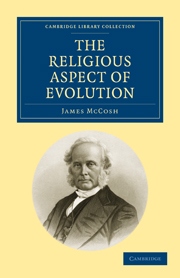Book contents
- Frontmatter
- PREFATORY NOTE TO SECOND EDITION
- PREFACE
- Contents
- CHAPTER I THE STATE OF THE QUESTION
- CHAPTER II THE ORGANIC HISTORY
- CHAPTER III POWERS MODIFYING EVOLUTION
- CHAPTER IV BENEFICENCE IN THE METHOD OF EVOLUTION
- CHAPTER V FINAL CAUSE IN EVOLUTION
- CHAPTER VI GEOLOGY AND SCRIPTURE
- CHAPTER VII THE AGE OF MAN
CHAPTER IV - BENEFICENCE IN THE METHOD OF EVOLUTION
Published online by Cambridge University Press: 05 March 2012
- Frontmatter
- PREFATORY NOTE TO SECOND EDITION
- PREFACE
- Contents
- CHAPTER I THE STATE OF THE QUESTION
- CHAPTER II THE ORGANIC HISTORY
- CHAPTER III POWERS MODIFYING EVOLUTION
- CHAPTER IV BENEFICENCE IN THE METHOD OF EVOLUTION
- CHAPTER V FINAL CAUSE IN EVOLUTION
- CHAPTER VI GEOLOGY AND SCRIPTURE
- CHAPTER VII THE AGE OF MAN
Summary
God in Evolution.—There is, or was, a wide-spread idea that the doctrine of development is adverse to religion. This has arisen mainly from the circumstance that it seems to remove God altogether, or at least to a greater distance from his works, and this has been increased by the circumstance that the theory has been turned to atheistic purposes. This impression is to be removed, first, by declaring emphatically that we are to look on evolution simply as the method by which God works. It is a forgotten circumstance that when Newton proclaimed the law of gravitation it was urged that he thereby took from God an important part of his works to hand it over to material mechanism, and the objection had to be removed in a quarto volume written by the celebrated mathematician, Maclaurin; and this was the more easily done from the circumstance that Newton was a man of profound religious convictions. The time has now come when people must judge of a supposed scientific theory, not from the faith or unbelief of the discoverer, but from the evidence in its behalf. They will find that whatever is true, is also good, and will in the end be favorable to religion.
A second erroneous impression needs to be effaced. Because God executes his purposes by agents, which it should be observed he has himself appointed, we are not therefore to argue that he does not continue to act, that he does not now act.
- Type
- Chapter
- Information
- The Religious Aspect of Evolution , pp. 58 - 68Publisher: Cambridge University PressPrint publication year: 2009First published in: 1890



